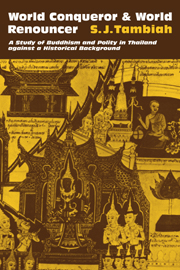 World Conqueror and World Renouncer
World Conqueror and World Renouncer Book contents
- Frontmatter
- Contents
- Acknowledgments
- PART ONE
- 1 Introduction: Reconstructing a Journey
- 2 From Rajadharma (the King's “Whole Duty”) to Dharmaraja (the “Righteous Ruler”)
- 3 The Brahmanical Theory of Society and Kingship
- 4 The Early Buddhist Conception of World Process, Dharma, and Kingship
- 5 Asoka Maurya: The Paradigm
- 6 Thai Kingship and Polity in Historical Perspective
- 7 The Galactic Polity
- 8 The Kingdom of Ayutthaya: Design and Process
- 9 Asokan and Sinhalese Traditions Concerning the Purification of the Sangha
- 10 The Sangha and the Polity: From Ayutthaya to Bangkok
- 11 The Nineteenth-Century Achievements of Religion and Sangha
- 12 The Sangha Acts of 1902, 1941, and 1963
- PART TWO
- Bibliography
- Index
9 - Asokan and Sinhalese Traditions Concerning the Purification of the Sangha
Published online by Cambridge University Press: 10 November 2010
- Frontmatter
- Contents
- Acknowledgments
- PART ONE
- 1 Introduction: Reconstructing a Journey
- 2 From Rajadharma (the King's “Whole Duty”) to Dharmaraja (the “Righteous Ruler”)
- 3 The Brahmanical Theory of Society and Kingship
- 4 The Early Buddhist Conception of World Process, Dharma, and Kingship
- 5 Asoka Maurya: The Paradigm
- 6 Thai Kingship and Polity in Historical Perspective
- 7 The Galactic Polity
- 8 The Kingdom of Ayutthaya: Design and Process
- 9 Asokan and Sinhalese Traditions Concerning the Purification of the Sangha
- 10 The Sangha and the Polity: From Ayutthaya to Bangkok
- 11 The Nineteenth-Century Achievements of Religion and Sangha
- 12 The Sangha Acts of 1902, 1941, and 1963
- PART TWO
- Bibliography
- Index
Summary
It is a commonplace of scholarship that the Buddha himself is credited with the recommendation that the community of bhikkhus organize and conduct their affairs in a fashion that is the very antithesis of the procedures of a centralized polity. In the Maha Parinibbana Suttanta the Buddha recommends that the bhikkhus conduct their affairs in the Vajjian style (which certain scholars label as the “republican” model as opposed to the “monarchical”): “So long, O mendicants, as the brethren foregather oft, and frequent the formal meetings of their Order – so long as they meet in concord, and rise in concord, and carry out in concord the duties of the Order. … so long may the brethren be expected not to decline, but to prosper.”
Further along in this famous discourse occurs the much quoted admonition to Ananda that the continuance of the brotherhood does not depend upon a leader: “Therefore, O Ananda, be ye lamps unto yourselves. Be ye a refuge to yourselves. … Look not for refuge to any one besides yourselves. …”
We have already (Chapter 5) cautioned against a simplistic assimilation of the Vajjian political style to a republican model, although the Buddha's alleged advice on how the sangha should conduct its affairs is a meaningful contrast with the conventions of kingly rule.
- Type
- Chapter
- Information
- World Conqueror and World RenouncerA Study of Buddhism and Polity in Thailand against a Historical Background, pp. 159 - 178Publisher: Cambridge University PressPrint publication year: 1976


